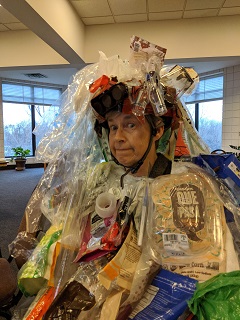
Some of the too many plastic containers found by the author.
Lori Olinger
When I joined the Zero Waste Task Force, I was interested in creating less trash and wanted to get better at recycling and composting. I’m still a big fan of recycling and composting, but when it comes to plastic, the more I learn, the more I try to phase it out of my life.
There is a staggering amount of plastic waste in the world: we produce about 300 million metric tons per year. And the U.S. comes in with the highest per capita rate: 287 pounds.
Plastic is made with toxic chemicals which get into our bodies through food and packaging. Recent studies have found associations between chemicals in plastic and serious health problems including infertility, obesity, and language delay in children. The risk is highest for infants and children.
Petrochemical plants that produce plastic cause health problems for people who live near them. St. James Parish in Louisiana, also known as “Cancer Alley,” is one example. The parish contains over 150 chemical plants and refineries, almost 50% of the population are people of color, and cancer rates are far above national averages.

Zero Waste Team member, Josie Winship,
wearing plastic litter she found in her
neighborhood and some of her own plastic
that she finds hard to avoid.
At the other end of the plastic life cycle, people who live near landfills and incinerators like the Hennepin County garbage burner (HERC) are also affected by pollution from plastic that contaminates soil, air, and water.
The U.S. also exports plastic waste to less-developed countries. Even if plastic does get recycled into something new like clothing or carpet, it still releases microplastic particles. That’s another area of concern since recent studies have found microplastics in blood and lung tissue.
It is possible to cut back on plastic by buying in bulk, using reusable containers, and buying less stuff. But it’s nearly impossible to avoid plastic because 40% of it is used for packaging. Since plastic is so cheap, companies use excessive amounts. A toaster I recently purchased came with three cardboard boxes, a Styrofoam block and multiple plastic bags! We are forced to accept plastic and pay for handling the waste through our taxes.
Systems Change Needed
When the responsibility for what to do with packaging is on the consumer, it's hard to enact meaningful change, but if we can put that responsibility back with the producers, real change is possible.
“Extended Producer Responsibility for Packaging” laws (aka EPR for Packaging) have been enacted in Maine and Oregon, and have been introduced in several other states, including Minnesota, where. Rep. Sydney Jordan and Sen. Kari Dziedzic authored HF4132/SF4518. The Zero Waste Task Force is supporting their bill because it will help reduce waste and make the products we use safer.
This legislation would put the cost of managing packaging back on businesses so that they make different choices. The bill would:
-
Charge a fee for packaging equal to the cost of managing the packaging waste.
-
Incentivize businesses to use less packaging.
-
Ban toxic chemicals from packaging.
-
Require businesses to make packaging more recyclable.
-
Require clear recycling labeling.
-
Permit recycling labels only for packaging where there is a market.
-
Improve and expand recycling infrastructure.
-
Fund pilot reuse/refill systems.
-
Provide recycling and composting education.
-
Administer the program through an independent organization.
Earth Overshoot Day, the day we start using more resources than Earth regenerates in a year, is July 17th; for the U.S., it’s March 13th. We need to use our resources more wisely and one way is to cut back on excessive packaging. Join us if you’re interested in working to support this bill and have an impact on the plastic crisis.
At the Zero Waste Team we educate individuals and advocate for systems change. We are engaged at the State Legislature, partner with the National Sierra Club, and engage locally, like with the Hennepin County Zero Waste planning and efforts to shut down the HERC. If you want to get involved, contact lori.olinger@northstar.sierraclub.org.
Lori Olinger is the chair of the chapter’s Zero Waste Task Force and a retired engineer. She is excited to be sharing zero waste practices at many events this summer.